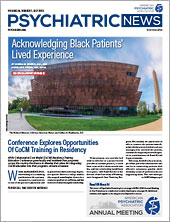At the Opening Session of APA’s Annual Meeting on May 20, incoming APA President Petros Levounis, M.D., M.A., unveiled the key elements of his presidential year, which will focus on the theme “Confronting Addiction: From Prevention to Recovery.” They include public engagement; outreach and education; and collaboration with other medical specialties, the government, and patient groups.
“Substance use, particularly opioids, has become a generational crisis in our country and one where, until recently, we have seen very little in the way of good news,” Levounis said. “An increase of 0.6% in overdose deaths in the U.S. was predicted by the National Center for Health Statistics between November 2021 and November 2022. Most likely due to our efforts and those of other physicians, psychologists, social workers, counselors, patient groups, and others too numerous to mention, our April 2023 analysis revealed a 2.8% decrease in reported overdose deaths instead. Is the tide finally turning? Perhaps, but there is so much more to be done.”
Levounis said he has established a presidential work group to be led by Smita Das, M.D., Ph.D., M.P.H., chair of the APA Council on Addiction Psychiatry, that will assist in the development, review, and promotion of content for quarterly public education campaigns centered around four topics: vaping, opioids, alcohol, and technology.
Collaboration with other medical groups will be central to the effort around addiction. Levounis said he met with the five other leaders of the “
Group of Six”—a coalition that includes APA and the professional organizations for family medicine, internal medicine, obstetrics/gynecology, osteopathic medicine, and pediatrics. “In July, we will meet with a broader group at APA headquarters in preparation for a major town hall meeting later in the year. A primary aim of this effort is to engage the permanent administrative staff of these like-minded organizations to optimize our chances for sustainable gains. We don’t want to just move the needle on addiction prevention and recovery. We want the needle to keep moving.”
More broadly, Levounis said he wants public engagement to be a prominent feature of his presidential year, and he described a great hunger among people for help and guidance around mental illness and substance use—for themselves and for their loved ones.
“As the World Health Organization declares an end to the global health emergency caused by the COVID-19 pandemic, we find ourselves facing a pandemic of psychiatric problems, particularly among our youth, the LGBTQ+ communities, and minority/underrepresented groups who continue to be impacted by health care disparities and structural racism,” he said.
“And yet, we have reason to hope and opportunities that we cannot afford to miss. The pandemic has caused—or more correctly, accelerated—an awakening among the public to the fundamental importance of mental health and to what psychiatry can offer. Rather than suffer in silence, more and more people are publicly discussing their struggles with mental illness and substance use disorders in an open and honest way that would have been hard to imagine a few years ago.
“There is a chorus of voices calling out for help and understanding of what you and I do every day,” he said. “… This is an unprecedented opportunity to engage with the public as a profession, as an association, and perhaps most importantly as individuals about who we are and how we help.”
He exhorted individual psychiatrists to speak up in their own communities and share their stories. “Each of us has a story about how we came to our calling as psychiatrists, about how mental health and substance use has touched our lives, directly or indirectly, and why it is we do what we do,” he said.
He recounted his own experience growing up the son of an internist father and a mother who was a nurse. In that “literal house of medicine” he found a passion. “As an undergraduate, I became fascinated with chemistry and during medical school developed a profound appreciation for sociology and the influence of culture and social structures. From molecules to people to policies, psychiatry and addiction psychiatry checked all the boxes,” he said. Levounis also cited the love and support of his parents; brother; and husband, actor Lukas Hassel.
“We have a voice,” he said. “Empowering our members to use that voice, directly engaging the public, expanding our workforce, and seizing upon this extraordinary opportunity to capitalize on the world’s newfound awareness of the centrality of mental health in people’s well-being will be essential tasks during my presidential year.” ■

